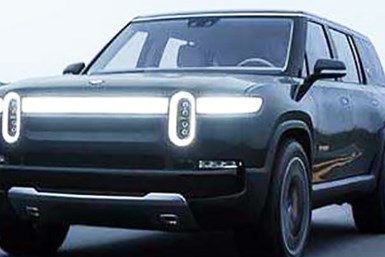Lincoln Pulls the Plug on Rivian-Based EV
COVID-19 continues to take its toll on vehicle programs
#hybrid
Several new vehicle launches have been postponed due to production shutdowns and the economic consequences of the coronavirus.
But no program in the U.S. had been officially canceled because of the pandemic, which has claimed more than 60,000 lives across the nation and some 220,000 worldwide.
Until now.
First COVID-19 New Vehicle Casualty
Ford’s upscale Lincoln unit is the first. This week, the luxury marque notified dealers that the unnamed electric vehicle it was developing with Plymouth, Mich.-based Rivian Automotive is no longer being pursued.
In a statement posted on its media website, Lincoln cited “the current environment” as the reason for the decision.
Ongoing Partnership
The Rivian-based Lincoln model, which was announced in January, was due to bow in 2022. It would have been Lincoln’s first full EV.

Rivian R1S
The vehicle, likely an SUV, was to have been built on Rivian’s skateboard-type EV chassis that will debut on the startup company’s own R1T pickup and R1S SUV. Earlier this month, Rivian announced it was delaying the introduction of those vehicles from late this year to early 2021 due to the coronavirus.
Despite this week’s cancelation, Ford and Rivian say their partnership remains strong, and that they plan to continue to work together on future (non-Lincoln) products. That makes sense, considering Ford invested $500 million in the startup last April and was part of an additional $1.3 billion funding round led by T. Rowe Price in December.
Amazon and Cox Automotive also made hefty investments in Rivian last year. In September, Amazon agreed to purchase 100,000 electric vans, which will be built on the same platform as the R1T and R1S, from Rivian. The first deliveries from that order were scheduled to begin next year. It isn’t clear if the timing of that program has been affected.
Lincoln’s Electrification Plans
Lincoln says it remains “fully committed to electrification.”

2020 Lincoln Aviator (Image: Lincoln)
The luxury brand’s only current offerings in the space are plug-in hybrid variants of its Aviator and Corsair crossover vehicles and MKZ Hybrid sedan.
China was expected to be one of the key target markets for the Rivian-based SUV. But demand for EVs there already had slowed considerably as the government phased out hefty incentives for the environmentally-friendly vehicles. The impact of COVID-19 compounded the problem, with overall new vehicle sales cratering in China over the last two months.
Sign of the Times
Ford and Rivian aren’t alone.
The spread of the coronavirus also has caused several other carmakers to push back their own plans.
General Motors opted not to unveil the upcoming Cadillac Lyriq, an all-electric SUV, as originally planned earlier this month. GM also is delaying the launch of an updated version of its Chevrolet Bolt EV into the 2022 model year.
Plans to take the wraps off the all-new GMC Hummer electric pickup next month in Las Vegas also have been derailed, according to Automotive News. But GM says the EV’s late 2021 launch still is on target.
In addition to the Lincoln SUV, Ford is postponing the launch of the Bronco Sport to early September, about two months later than previous plans, AN says.
Carmakers aim to resume production in the U.S. in about three weeks. But the ramp-up likely will be gradual until consumer demand starts to return and the impact of the coronavirus is better understood. Until then, additional delays are likely.
RELATED CONTENT
-
What the VW ID. BUGGY Indicates
Volkswagen will be presenting a concept, the ID. BUGGY, a contemporary take on a dune buggy, based on the MEB electric platform that the company will be using for a wide array of production vehicles, at the International Geneva Motor Show.
-
EV Truck & SUV That Aren’t Rivian
A closer look at what Bollinger Motors is developing
-
Engineering the 2019 Jeep Cherokee
The Jeep Cherokee, which was launched in its current manifestation as a model year 2014 vehicle, and which has just undergone a major refresh for MY 2019, is nothing if not a solid success.

